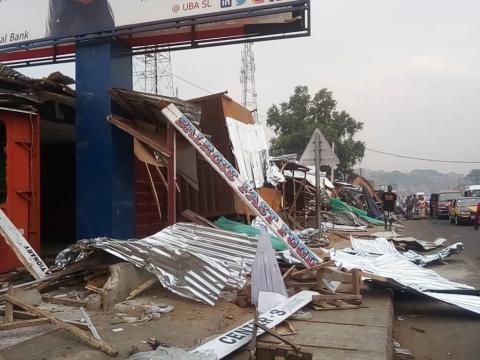By Alpha Abu
High level engagements have continued between local authorities and traders at Jui whose wares were over the weekend destroyed by a team from the Sierra Leone Roads Authority (SLRA) in the enforcement of its Right of Way. Some of the wares were also looted.
The traders had set up stalls and shops in shipping containers in areas along a side of the Freetown Teachers’ College (FTC) fence where numerous businesses had sprung up in recent times.
The roads authority said they had fallen within the Right of Way, causing gridlock and suffocating the artery into and out of the capital.
The demolition of the shops and makeshift structures took place during curfew hours, around 11 pm on Saturday 6 February 2021.
Police say they provided security as the demolition team went about ripping and overturning the metal container shops and razed to the ground the makeshift structures and tables on which traders displayed their wares.
By the following Sunday morning the stretch along the FTC sidewall was like the scene of a battle or a typhoon of unimaginable proportions with mangled metal and debris scattered and spilled onto the sidewalk.
Kossoh Town headman Emeric Coker whose administration covers the Jui area, explained to Politico about the successful convening of two meetings on Monday and Tuesday at the Kossoh Town Community Centre involving the affected traders, their national Union representatives, ONS, Rural Council and community leaders.
He said the traders were advocating for at least a reasonable compensation and for them to be allowed to resume their businesses in the same location.
Jui Headman, Emeric Coker disclosed that the over 60 aggrieved traders had assured the authorities of their readiness to keep the peace as they waited on the response from the relevant bodies.
According to Western Rural District Council Chairman, Kasho Holland-Cole, he had earlier sought the permission of the Principal of FTC for the traders to have those structures erected by the fence, so they could stop from selling in the street and disrupting human and vehicular movements while they were constructing markets for them.
The understanding was that the traders were to relocate to one of three markets that the China Railway Seventh Group were to build for the Council as contained in their agreement with the previous government, for being awarded the contract to construct the Wellington- Masiaka toll road.
He said news had earlier circulated of a pending destruction of all structures along the disputed area which prompted him to contact ONS officials. He said all the various stakeholders were to meet to discuss the issue, only for him to receive a call about the Jui incident but also that of the bringing down of tables on the Grafton highway that mostly women use for the selling of spring water to passing motorists.
Holland-Cole said the action shocked and surprised him as the water sellers at Grafton did not in any way interfere with traffic. The area is decongested and is largely a combination of industrial and residential settlement scattered around a wide area.
A woman who goes by the name Nurse Kadiatu Sannoh said she had lost over Le 140 million after her boutique from a converted shipping container was destroyed at Jui. She said she had very nice and expensive artificial hair each bunch of which was sold for Le 3.5 million. She said she also had listed women and children’s clothing, shoes, bags amongst the things in her boutique all of which were damaged or carted away.
She argued that if they had been forewarned they would have had time to remove all their goods. She claimed the demolition was carried out by SLRA and also pointed a finger at the FTC authorities whom she alleged had given a portion of the college land at the rear of their shops, to a businessman that owns a company called Bokum that had started building a chain of stores.
She believed that creating an opening frontage for those stores led to the controversial decision which she said could have been avoided, as they had on several occasions engaged the principal of FTC for them to be allowed to do their trading until the proposed Chinese market was ready for their relocation.
We were unable to reach FTC officials for their version of events.
The destruction of the structures degenerated into riots by angry traders on Sunday morning leading to the police using teargas to quell the disturbances.
That was immediately followed by a police press release that the demolition exercise was “aimed at decongesting and freeing up the traffic around those areas”. 22 people were arrested.
Traffic along the Jui intersection is gridlocked especially in the morning and evening rush hours. Commercial buses and taxis often compound the problem by stopping at random to allow passengers to board or alight. Jui has become a thriving business but also a chaotic place.
Copyright © 2021 Politico Online








